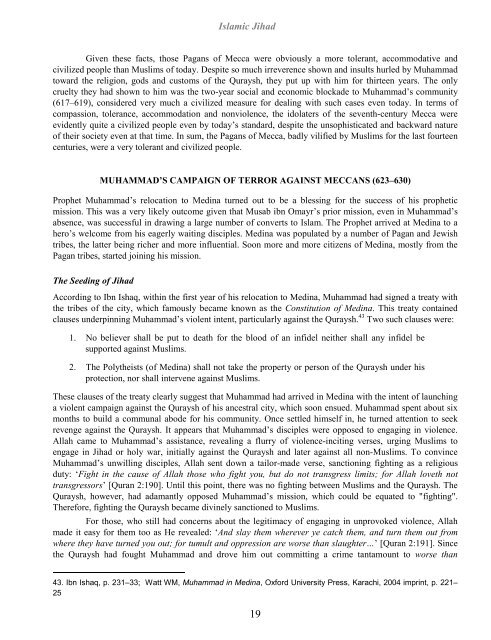islamic-jihad-legacy-of-forced-conversion-imperialism-slavery
islamic-jihad-legacy-of-forced-conversion-imperialism-slavery
islamic-jihad-legacy-of-forced-conversion-imperialism-slavery
- No tags were found...
Create successful ePaper yourself
Turn your PDF publications into a flip-book with our unique Google optimized e-Paper software.
Islamic JihadGiven these facts, those Pagans <strong>of</strong> Mecca were obviously a more tolerant, accommodative andcivilized people than Muslims <strong>of</strong> today. Despite so much irreverence shown and insults hurled by Muhammadtoward the religion, gods and customs <strong>of</strong> the Quraysh, they put up with him for thirteen years. The onlycruelty they had shown to him was the two-year social and economic blockade to Muhammad’s community(617–619), considered very much a civilized measure for dealing with such cases even today. In terms <strong>of</strong>compassion, tolerance, accommodation and nonviolence, the idolaters <strong>of</strong> the seventh-century Mecca wereevidently quite a civilized people even by today’s standard, despite the unsophisticated and backward nature<strong>of</strong> their society even at that time. In sum, the Pagans <strong>of</strong> Mecca, badly vilified by Muslims for the last fourteencenturies, were a very tolerant and civilized people.MUHAMMAD’S CAMPAIGN OF TERROR AGAINST MECCANS (623–630)Prophet Muhammad’s relocation to Medina turned out to be a blessing for the success <strong>of</strong> his propheticmission. This was a very likely outcome given that Musab ibn Omayr’s prior mission, even in Muhammad’sabsence, was successful in drawing a large number <strong>of</strong> converts to Islam. The Prophet arrived at Medina to ahero’s welcome from his eagerly waiting disciples. Medina was populated by a number <strong>of</strong> Pagan and Jewishtribes, the latter being richer and more influential. Soon more and more citizens <strong>of</strong> Medina, mostly from thePagan tribes, started joining his mission.The Seeding <strong>of</strong> JihadAccording to Ibn Ishaq, within the first year <strong>of</strong> his relocation to Medina, Muhammad had signed a treaty withthe tribes <strong>of</strong> the city, which famously became known as the Constitution <strong>of</strong> Medina. This treaty containedclauses underpinning Muhammad’s violent intent, particularly against the Quraysh. 43 Two such clauses were:1. No believer shall be put to death for the blood <strong>of</strong> an infidel neither shall any infidel besupported against Muslims.2. The Polytheists (<strong>of</strong> Medina) shall not take the property or person <strong>of</strong> the Quraysh under hisprotection, nor shall intervene against Muslims.These clauses <strong>of</strong> the treaty clearly suggest that Muhammad had arrived in Medina with the intent <strong>of</strong> launchinga violent campaign against the Quraysh <strong>of</strong> his ancestral city, which soon ensued. Muhammad spent about sixmonths to build a communal abode for his community. Once settled himself in, he turned attention to seekrevenge against the Quraysh. It appears that Muhammad’s disciples were opposed to engaging in violence.Allah came to Muhammad’s assistance, revealing a flurry <strong>of</strong> violence-inciting verses, urging Muslims toengage in Jihad or holy war, initially against the Quraysh and later against all non-Muslims. To convinceMuhammad’s unwilling disciples, Allah sent down a tailor-made verse, sanctioning fighting as a religiousduty: ‘Fight in the cause <strong>of</strong> Allah those who fight you, but do not transgress limits; for Allah loveth nottransgressors’ [Quran 2:190]. Until this point, there was no fighting between Muslims and the Quraysh. TheQuraysh, however, had adamantly opposed Muhammad’s mission, which could be equated to "fighting".Therefore, fighting the Quraysh became divinely sanctioned to Muslims.For those, who still had concerns about the legitimacy <strong>of</strong> engaging in unprovoked violence, Allahmade it easy for them too as He revealed: ‘And slay them wherever ye catch them, and turn them out fromwhere they have turned you out; for tumult and oppression are worse than slaughter…’ [Quran 2:191]. Sincethe Quraysh had fought Muhammad and drove him out committing a crime tantamount to worse than43. Ibn Ishaq, p. 231–33; Watt WM, Muhammad in Medina, Oxford University Press, Karachi, 2004 imprint, p. 221–2519


